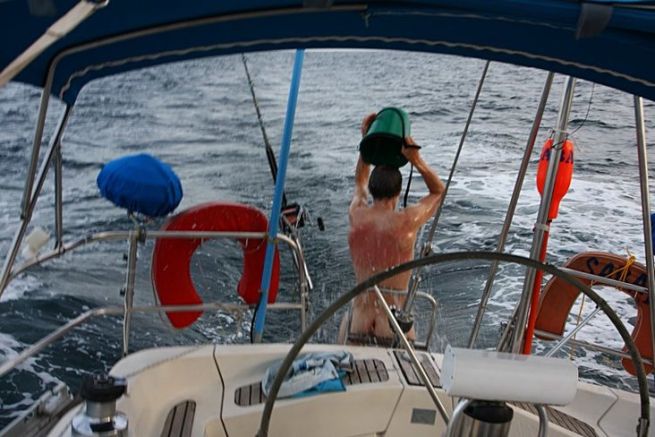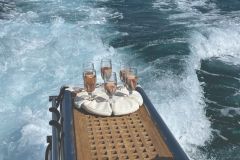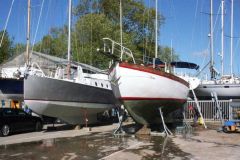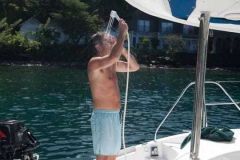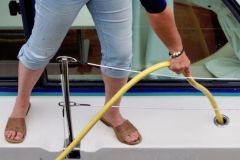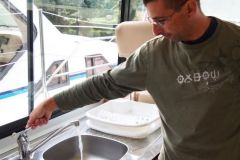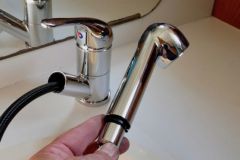Sea water, not at all incompatible
Sea water is salty. More so when you sail in the Mediterranean than in the Atlantic. That's for sure. But this should not prevent us from swimming, or at least from washing with it... In fact, it is the salt that, by drying on our skin, will cause discomfort. Once we know that, we just have to get rid of it when we get out of the water.
For this, it is strongly advised not to let yourself dry by lounging in the sun. On the contrary, rub your body and hair vigorously as soon as you get out of the water. It is the mechanical action of drying that will eliminate the salt from our body. Therefore, you should rub and only rub. With a towel, you dry your body well and no allergy or irritation occurs.
Knowing this, we will be able to take advantage of sea water for many uses on board. And above all, you will be able to do without the constraints of fresh water on board. Indeed, to have fresh water, you have to go back to port regularly to fill your tanks, or have a watermaker (very expensive) and be able to operate it (the watermaker requires a lot of energy and often needs a generator...). In short, it is expensive and complicated to maintain.
So why not do without fresh water and use only sea water?
The shower
For the shower the solid soap does not work with sea water. It does not lather. On the other hand, liquid soaps and shower gel work perfectly. Just like shampoo. So you can wash yourself completely with sea water and come out clean smelling like soap! To respect the environment, we can't recommend biodegradable products enough so as not to pollute your environment. Some brands (like Matt Chem) even offer "Special seawater" products.
The dishes
You can also wash the dishes with sea water. Once the dishes are clean, you can remove the salt by drying them or use fresh water just for the final rinse. Dishwashing liquid works very well with sea water, but your grey water (from the kitchen sink) goes directly into the sea, so we recommend that you use a non-polluting product.
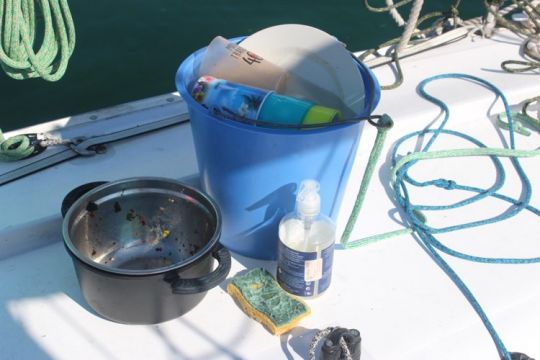
Laundry
Just like the body or the dishes, you can also wash your clothes with sea water. Either in small portable washing machines or even by hand. The important thing is then to dry it in the open air. Indeed, once again, the salt crystals will not remain embedded in the fibers, but will come off if the fabric is blowing in the wind. For the record, Bernard Moitessier during his long journey washed wool sweaters with sea water and sent them on halyards to dry in the wind.
The importance of the seawater pump
As you can see, sea water can be used very regularly on board. For this you can always draw it with a bucket thrown overboard to be filled. But more simply, you can also install a seawater pump that draws water directly from around you to deliver it directly into the kitchen sink. You can also equip your rear skirt with a seawater shower. This avoids pumping into the hold as soon as a bather gets out of the water. Unfortunately, more and more seawater pumps are disappearing from new boats. Think of asking for it as an option for your next boat..
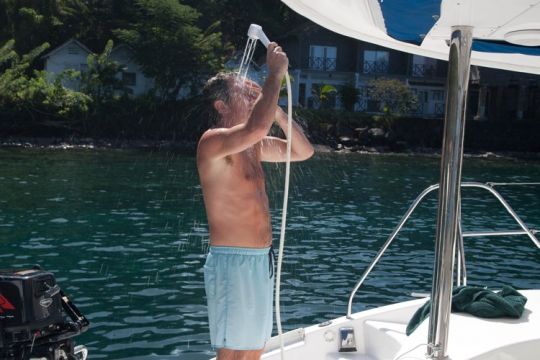
Where fresh water is essential
There are a few times when using fresh water is a must. This is the case for shaving for example. Indeed, if you can do it with sea water, the razor blades do not support it and rust almost instantly! Likewise, for brushing your teeth, a glass of fresh water for rinsing is more appreciable than the equivalent in sea water. Finally, for tea or coffee, it is difficult to do without fresh water..
Last point, for everything that is cooked (pasta, rice, potatoes, vegetables ...), know that cooking in seawater will over-salt the food. They will be inedible. To restore the right amount of salt, you need a mixture of sea water and fresh water in a proportion of 1/3 sea water and 2/3 fresh water. And your pasta cooked at the foot of Etna off the coast of Sicily will be the best in the world!
